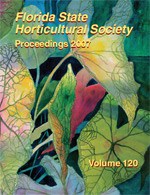Abstract
Galia muskmelon (Cucumis melo L. var. Reticulatus Ser.) is an F1 hybrid known for exceptional fruit flavor. Since introduction to the market in 1973, the original 'Galia' has become a trade name for look-alike cultivars. Some 'Galia'-type cultivars are firmer, ship well, and may be less susceptible to powdery mildew [Podosphaera xanthii (Px) (syn. Sphaerotheca fulignea)] than a true 'Galia', but often lack the sweetness and flavor of the original hybrid. The objective of this study was to identify 'Galia'-type cultivars with similar sweetness of the true 'Galia' while at the same time producing excellent yields with improved resistance to powdery mildew, a common disease for producers in a protected environment. During Fall 2005 and Spring 2006, various 'Galia' and 'Galia'-type cultivars were grown in a passively ventilated greenhouse in Citra, FL and evaluated for fruit yield, quality (fruit size, soluble solids content and firmness), and powdery mildew susceptibility. Powdery mildew disease severity ratings (DSR) were recorded weekly from the first appearance of disease until final harvest. Area under disease progress curve (AUDPC) values were also calculated from weekly DSR ratings. Results from the two seasons indicated that cultivars Nestor, Galileo, and Vicar were suitable and are recommended for greenhouse production because of their powdery mildew disease tolerance, high yields and fruit quality.

